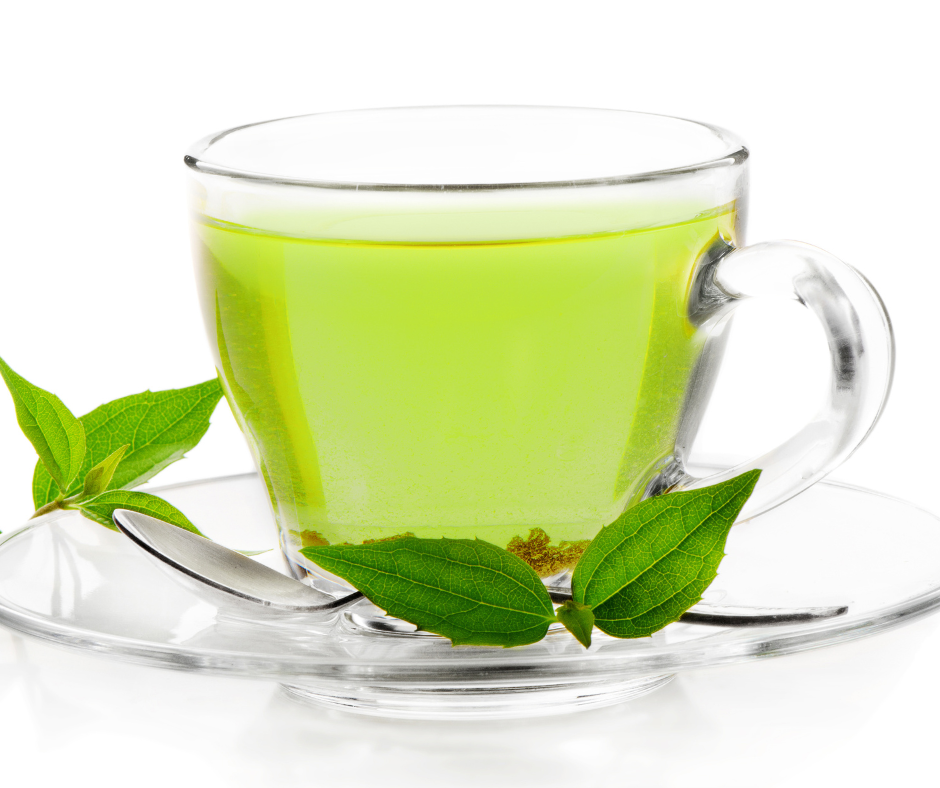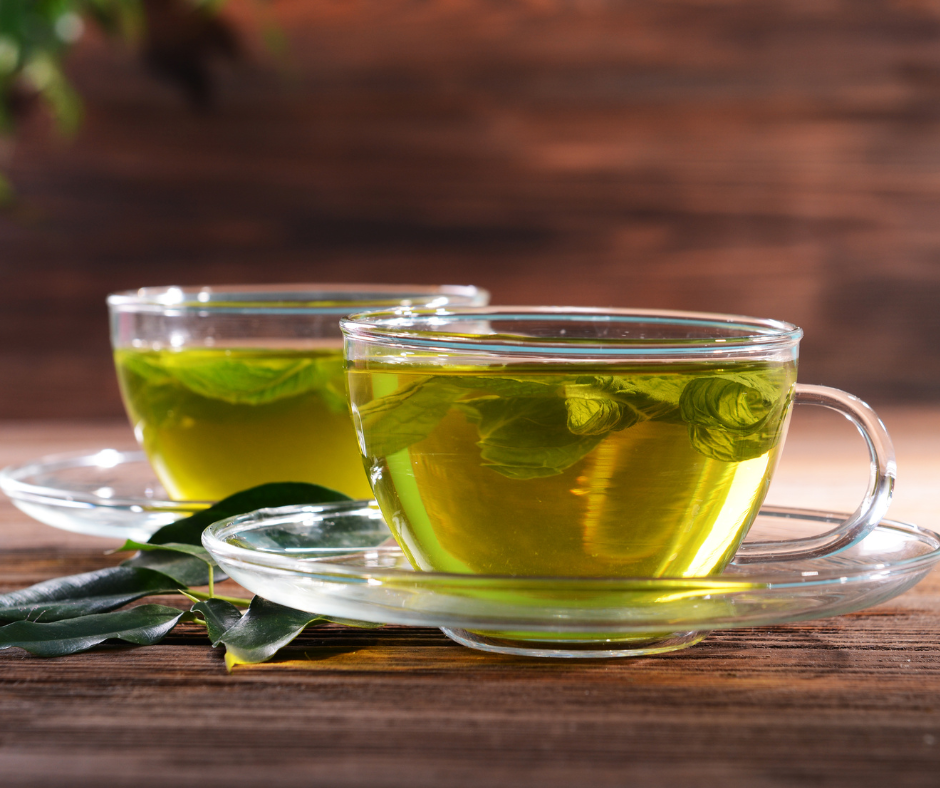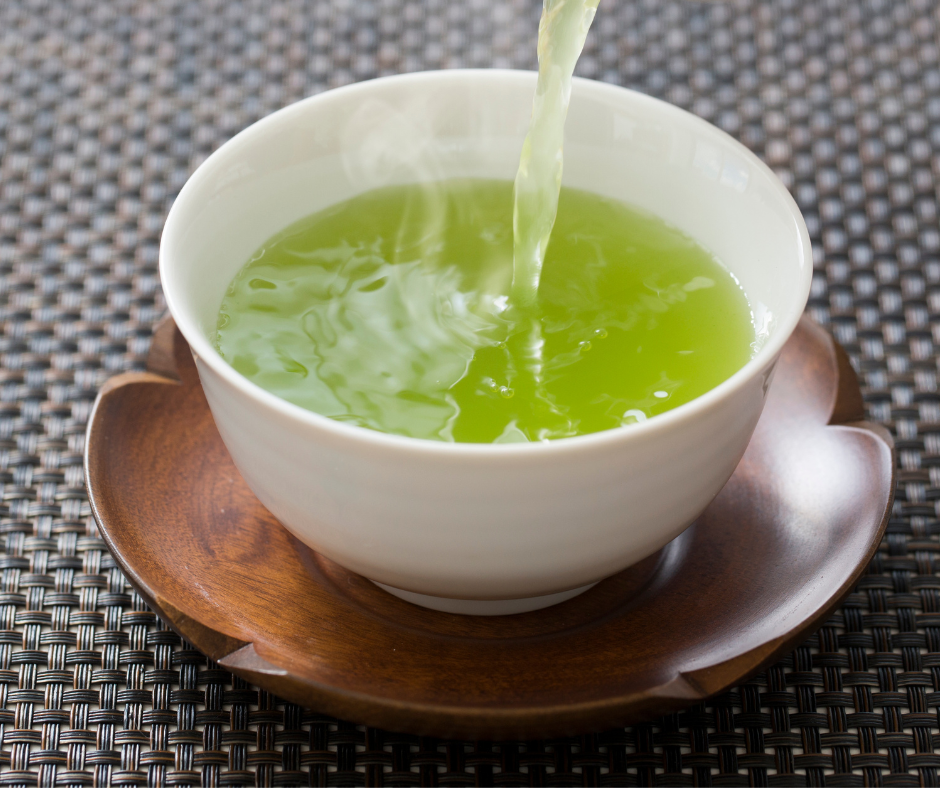Introduction To Green Tea And Caffeine Content
Green tea is a popular beverage that is enjoyed by millions of people around the world. Besides being refreshing and delicious, green tea also offers various health benefits. One aspect of green tea that often piques people’s interest is its caffeine content. Keep reading if you’re curious about ‘How Much Caffeine in a Bag of Green Tea?‘ and what factors can affect it!
Overview Of Green Tea And Its Caffeine Levels
Green tea contains caffeine, although the amount can vary depending on several factors. On average, a typical bag of green tea contains approximately 20-45 milligrams (mg) of caffeine per 8-ounce cup. It’s important to note that this is much lower than coffee, which usually contains around 95 mg of caffeine per cup.
The caffeine content in green tea is influenced by various factors, including the type of tea leaves used, the processing methods, and the steeping time. Japanese green teas like matcha and sencha tend to have lower caffeine levels than Chinese green teas like gunpowder and Dragonwell—the younger and more tender the tea leaves, the higher the caffeine content.
Understanding The Factors Affecting Caffeine Content In Green Tea
Several factors can affect the caffeine content in green tea:
- Type of tea leaves: Different varieties of tea plants have varying caffeine levels. Camellia sinensis var. sinensis, commonly grown in China, has a higher caffeine content than Camellia sinensis var. assamica, mainly grown in India.
- Processing methods: The level of oxidation and fermentation during tea processing can impact the caffeine content. Green tea is minimally oxidized, which helps retain a higher proportion of caffeine compared to black tea.
- Steeping time and temperature: Steeping green tea for a shorter time and at a lower temperature can result in a lower caffeine extraction rate.
- Number of infusions: Subsequent infusions of the same tea leaves generally have lower caffeine content than the first infusion.
Understanding these factors can help you make better decisions when choosing and preparing your cup of green tea. If you’re looking for a lower caffeine option, you may opt for Japanese green teas, shorter steeping times, or even decaffeinated green teas.
In conclusion, green tea contains caffeine, but the levels can vary depending on several factors. By understanding these factors, you can make informed choices about the type of green tea and the brewing methods that suit your preference and caffeine tolerance. So enjoy your cup of green tea, knowing that you’re savoring a delicious beverage and a source of potential health benefits!
How Much Caffeine in a Bag of Green Tea?
Many people turn to green tea when choosing a beverage to kickstart your day or provide a mid-afternoon pick-me-up. Rich in antioxidants and known for its potential health benefits, green tea has gained popularity worldwide. But How Much Caffeine in a Bag of Green Tea? Let’s take a closer look.
Caffeine Content In A Single Bag Of Green Tea
The exact amount of caffeine in green tea can vary depending on several factors, such as the type of tea leaves, brewing methods, and the specific brand. On average, a single bag of green tea typically contains around 20-45 milligrams of caffeine. However, it’s important to note that these numbers are approximate, and the caffeine content may differ slightly.
While green tea generally contains less caffeine than coffee or black tea, it still provides a mild energy boost. The caffeine in green tea is often referred to as “theine” because it contains other beneficial compounds that can affect how caffeine is absorbed and processed in the body. This can result in a more balanced and sustained energy boost than the jittery effects sometimes associated with coffee.
Factors Impacting The Caffeine Levels In Different Brands
The caffeine content in green tea can vary from one brand to another. Some factors that can influence the caffeine levels include the following:
- Type of green tea leaves: Different varieties of green tea, such as matcha or sencha, may contain varying amounts of caffeine. Matcha, for example, is made from powdered green tea leaves and generally has a higher caffeine content than other green tea types.
- Brewing time and temperature: Brewing your green tea for a longer time and using hotter water can release more caffeine into the infusion. Following the brewing instructions provided by the specific green tea brand is recommended to achieve the desired taste and caffeine level.
- Serving size: The amount of green tea leaves used per bag or serving can impact the caffeine concentration. Some brands may use larger or finer tea leaves, resulting in different caffeine levels.
It’s important to remember that while green tea contains caffeine, it also offers unique health benefits and a gentler energy boost compared to other caffeinated beverages. If you’re sensitive to caffeine, you may consider opting for decaffeinated green tea or limiting your consumption in the evenings.
Understanding the caffeine content in a single bag of green tea can help you make informed decisions and tailor your tea-drinking routine to suit your preferences and caffeine tolerance.
Caffeine Content In Brewed Green Tea
The Varying Caffeine Levels In Brewed Green Tea
Green tea is a popular beverage known for its numerous health benefits and refreshing taste. It contains caffeine in lower amounts than other tea or coffee types. The caffeine content in green tea can vary depending on several factors, including the type of tea leaves, the brewing method, and the steeping time.
On average, an 8-ounce cup of brewed green tea contains about 25-40 milligrams of caffeine. It is important to note that these values are approximate and can differ from brand to brand or even batch to batch. Some green teas may have lower caffeine levels, while others might have slightly higher amounts.
Effects Of Brewing Time And Water Temperature On Caffeine Extraction
The caffeine content in green tea can be influenced by the brewing time and water temperature during the infusion process. Generally, a longer brewing time or higher water temperature can result in higher caffeine extraction.
When green tea leaves are steeped in hot water, the caffeine is extracted from the leaves and dissolved into the brew. The amount of time the leaves are steeped, and the water temperature affects how much caffeine is released.
You can use shorter steeping or cooler water temperatures if you prefer a lower caffeine content in your brewed green tea. Steeping the tea for around 1-2 minutes and using a water temperature of around 160-175°F can help reduce caffeine extraction.
It’s worth noting that green tea also contains an amino acid called L-theanine, which has a calming effect and can offset the potential jitters caused by caffeine. This is why green tea provides a more sustained and gentle energy boost than coffee.
In conclusion, understanding the caffeine content in brewed green tea can help you make informed choices and manage your caffeine intake. Remember that the exact caffeine levels can vary, and adjusting the brewing time and water temperature can impact the caffeine extraction. So brew yourself a cup of green tea and enjoy its many benefits!
Comparing Caffeine Content: Green Tea Vs. Other Beverages
Caffeine Content Comparison Of Green Tea With Coffee And Black Tea
If you’re a tea lover, you may wonder, ‘How Much Caffeine in a Bag of Green Tea?’. Compared to other beverages like coffee and black tea, green tea generally contains lower levels of caffeine. On average, an 8-ounce cup of green tea contains about 28 milligrams of caffeine, while the same amount of coffee contains approximately 95 milligrams. Black tea falls somewhere between, with around 47 milligrams of caffeine per 8-ounce serving.
This means that if you’re looking for a gentle boost without the jitters or crashes associated with higher caffeine content, green tea could be a great option. It provides a milder form of stimulation that can help you stay alert and focused throughout the day.
Health Benefits And Implications Of Consuming Caffeine
Consuming caffeine can have both positive and negative effects on your health. On the positive side, caffeine has been shown to improve mental alertness, increase metabolism, and enhance athletic performance. It can also temporarily boost energy levels and help you stay awake when you need to.
However, it’s important to be mindful of caffeine intake, as excessive consumption can lead to negative effects. Too much caffeine can cause restlessness, anxiety, disrupted sleep patterns, and even heart palpitations in some individuals. It’s also important to remember that caffeine is a stimulant, and excessive consumption can lead to dependence or addiction.
Consuming it in moderation is recommended to make the most of your green tea experience. Limiting your intake to a few cups per day can help you enjoy the health benefits of green tea without going overboard on caffeine.
In conclusion, green tea is a fantastic choice if you’re looking for a beverage with a more moderate caffeine content. It offers a gentle boost without the excessive levels found in coffee, making it a perfect option for those who want to stay energized throughout the day without sacrificing their sleep or experiencing caffeine-related side effects. So, go ahead and brew yourself a cup of green tea and enjoy its refreshing taste and potential health benefits.
Managing Caffeine Intake From Green Tea
For tea enthusiasts, understanding how much caffeine is in a bag of green tea can help them manage their caffeine intake and make informed choices. While green tea is known for its health benefits, it also contains caffeine in lesser amounts than coffee. Here’s what you need to know to understand your tea better.
Recommended Caffeine Limits And Guidelines
Green tea typically contains around 25-40 milligrams of caffeine per 8-ounce cup, while black tea can have 40-70 milligrams. The caffeine content may vary based on factors such as the brand, steeping time, and water temperature. It’s important to note that teas labeled as decaffeinated may still contain traces of caffeine, although significantly less than regular teas.
If you are sensitive to caffeine or trying to limit your intake, here are a few guidelines to consider:
- Know your limits: The Food and Drug Administration recommends a daily caffeine intake of no more than 400 milligrams for healthy adults. Monitoring your overall caffeine consumption and being aware of the caffeine content in your green tea can help you stay within these guidelines.
- Opt for lower-caffeine teas: If you’re concerned about the caffeine content, you can choose varieties like Japanese matcha or white tea, which have relatively lower caffeine levels than regular green tea.
Tips For Adjusting Green Tea Consumption Based On Caffeine Sensitivity
If you find that green tea still affects your sleep or causes jitters, here are some tips for adjusting your consumption:
- Choose lighter brews: Steeping green tea for a shorter period or using lower water temperatures can help reduce caffeine extraction. Experiment with different brewing techniques to find the right balance for your taste preferences and caffeine sensitivity.
- Try herbal alternatives: Herbal teas like chamomile, peppermint, or rooibos are naturally caffeine-free and can make a soothing alternative to green tea. They offer various flavors and health benefits without the worry of caffeine.
Understanding the caffeine content in green tea and managing your consumption can help you enjoy the many benefits of tea while staying within your desired caffeine limits. Whether you’re looking for a morning pick-me-up or a relaxing evening beverage, knowing your tea can empower you to make the best choices for your health and well-being.
FAQ: How Much Caffeine in a Bag of Green Tea: Understanding Your Tea
Q: Does powdered green tea, like matcha, contain more caffeine than loose-leaf or green tea bags?
A: Yes, powdered green tea, like matcha, does contain more caffeine than loose-leaf or green tea bags.
Q: How does the caffeine content in green tea compare to other caffeinated beverages?
A: Green tea contains less caffeine than other caffeinated beverages such as black tea, coffee, soft drinks, and energy drinks.
Q: How much caffeine is present in an 8-ounce serving of green tea?
A: On average, an 8-ounce serving of green tea contains around 35 mg of caffeine. It’s important to note that this can vary.
Q: What are the recommended limits for caffeine consumption?
A: Consuming up to 200 mg of caffeine, which is roughly equivalent to four 8-ounce cups of green tea, is considered within the recommended limits. As long as you stay within these limits, the caffeine in green tea shouldn’t be a cause for concern.
Q: How can I control the caffeine content in my cup of green tea?
A: The caffeine content in your cup of green tea can be influenced by various factors, such as tea cultivation and brewing methods. For example, teas that are grown in the shade, like many Japanese green teas, tend to have higher caffeine content. Additionally, different tea varieties may have varying amounts of caffeine. By understanding how the tea is grown and made, you can have more control over the caffeine content in your cup.
Q: How does shade-grown tea affect the caffeine content?
A: Shade-grown teas naturally retain more caffeine in the plant. Many Japanese green teas, such as matcha, are grown in the shade. In addition to higher caffeine content, shade-grown teas also tend to have increased levels of L-theanine, a compound that promotes feelings of relaxation. This unique combination provides a gentle and sustained energy boost.
Q: Are there significant caffeine content variations among different green tea types?
A: There can be significant variations in caffeine content among different types of green tea. On average, a typical cup of green tea contains around 25-45 mg of caffeine per 8-ounce cup. However, some teas, such as Sencha, may have higher caffeine content, while others, like Dragonwell, may have lower caffeine content. Understanding the tea-making process can give you an idea of which teas may have higher or lower amounts of caffeine.
Conclusion
In conclusion, understanding ‘How Much Caffeine in a Bag of Green Tea?’ is essential for making informed consumption decisions. While green tea is generally lower in caffeine than other caffeinated beverages, it still contains caffeine, which can have varying effects on individuals.
Summary Of Key Points
- Green tea is a popular beverage known for its numerous health benefits and lower caffeine content than coffee or black tea.
- The caffeine content in green tea can vary depending on factors such as the type of tea, brewing method, and steeping time.
- On average, a bag of green tea contains around 25-40 milligrams of caffeine, which can be higher or lower depending on the specific tea brand and variety.
- Caffeine in green tea has a milder and more gradual effect than coffee, providing a gentle energy boost without the jitters or crashing.
- Some individuals may be more sensitive to caffeine and may experience side effects such as restlessness, increased heart rate, or difficulty sleeping. It is important to be mindful of personal caffeine tolerance and consume green tea accordingly.
- Decaffeinated green tea options are available for those sensitive to caffeine or who prefer to limit their caffeine intake.
- Green tea also contains other beneficial compounds, such as antioxidants and catechins, contributing to its health-promoting properties.
Understanding The Caffeine Content In Green Tea For Informed Consumption Decisions
By understanding the caffeine content in a bag of green tea, individuals can make informed choices about their consumption. This knowledge allows them to enjoy the numerous health benefits of green tea without consuming excessive amounts of caffeine. Whether starting the day with a cup of refreshing green tea or winding down in the evening with a soothing brew, being aware of the caffeine content ensures that individuals can tailor their green tea intake to suit their needs and preferences.
In conclusion, green tea offers a flavorful and healthful beverage option, and understanding its caffeine content empowers individuals to make informed decisions about their tea consumption. So go ahead, brew a cup of green tea, and savor its goodness while being mindful of its caffeine.

Deb Carlson at Crosslake Coffee: Join Deb at Crosslake Coffee for a delightful blend of community, caffeine, and creativity. Discover the cozy ambiance and warm hospitality that make this local coffee shop a beloved gathering spot. From expertly crafted espresso drinks to mouthwatering pastries, Deb invites you to savor every sip and bite. Stay connected with the latest updates on specials, events, and live music performances by following Deb Carlson at Crosslake Coffee on social media. Embrace the vibrant online community and share your love for great coffee and good company with fellow enthusiasts. Don’t miss out on a moment of the Crosslake Coffee experience – connect with Deb on social media today.



